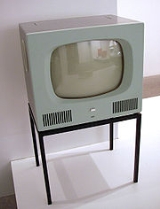
medium for transmitting and receiving moving images that can be monochrome
(black-and-white
) or colored, with accompanying sound. "Television" may also refer specifically to a television set
, television program
ming, television transmission
.
The etymology of the word has a mixed Latin and Greek origin, meaning "far sight": Greek tele , far, and Latin visio, sight (from video, vis- to see, or to view in the first person).
Commercially available since the late 1920s, the television set has become commonplace in homes, businesses and institutions, particularly as a vehicle for advertising
, a source of entertainment, and news
.
1925 John Logie Baird performs the first test of a working television system.
1927 The first fully electronic television system is achieved by Philo Taylor Farnsworth.
1928 Charles Jenkins Laboratories of Washington, D.C. becomes the first holder of a television license from the Federal Radio Commission.
1947 The World Series, featuring the New York Yankees and the Brooklyn Dodgers, is televised for the first time.
1947 ''Meet the Press'' makes its television debut (the show went to a weekly schedule on September 12, 1948).
1948 ''Toast of the Town'', later ''The Ed Sullivan Show'', makes its television debut.
1948 ''Candid Camera'' makes its television debut after being on radio for a year as ''Candid Microphone''.
1949 ''The Goldbergs'', the first sitcom on American television, first airs.
1949 Fireside Theater debuts on television.
1949 KC2XAK of Bridgeport, Connecticut becomes the first Ultra high frequency (UHF) television station to operate a daily schedule.
The luminous screen in the home carries fantastic authority. Viewers everywhere tend to accept it as a window on the world... It has tended to displace or overwhelm other influences such as newspapers, school, church, grandpa, grandma. It has become the definer and transmitter of society's values.![]()
For intellectual authority, the appropriate version of Descartes's cogito would be today: I am talked about, therefore I am.![]()
It is a medium of entertainment which permits millions of people to listen to the same joke at the same time, and yet remain lonesome.![]()
Television has done much for psychiatry by spreading information about it, as well as contributing to the need for it.![]()
like the invention of indoor plumbing. It didn’t change people’s habits. It just kept them inside the house.![]()

